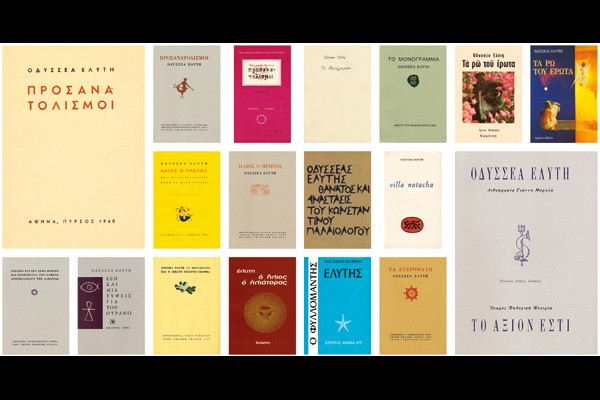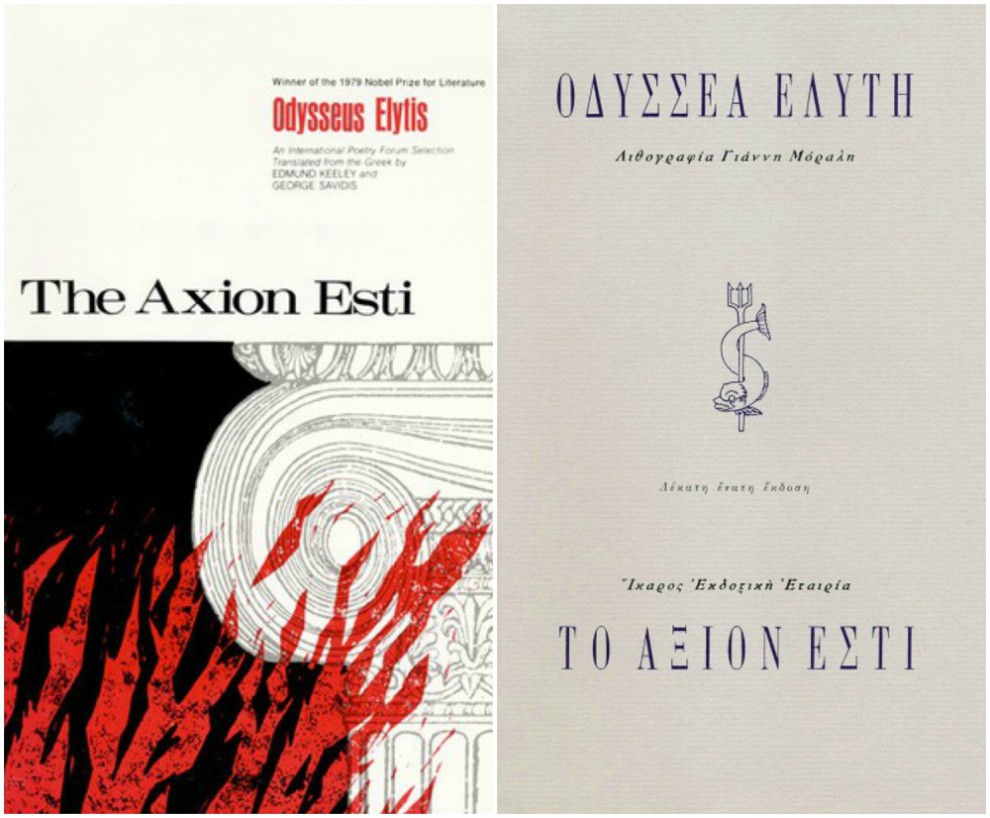On 18 October 1979, one of Greece’s major poets, Odysseus Elytis, was awarded with the Noble Prize for Literature. The Swedish Academy declared in its presentation that Elytis’ poetry “depicts with sensual strength and intellectual clearsightedness, modern man’s struggle for freedom and creativeness. . . . [In] its combination of fresh, sensuous flexibility and strictly disciplined implacability in the face of all compulsion, Elytis’ poetry gives shape to its distinctiveness, which is not only very personal but also represents the traditions of the Greek people“.
To be a Greek and a part of its twenty-five-century-old literary tradition was to Elytis a matter of great pride. His words, upon acceptance of the Nobel Prize, gave evidence of this deep regard for his people and country: “I would like to believe that with this year’s decision, the Swedish Academy wants to honor in me Greek poetry in its entirety. I would like to think it also wants to draw the attention of the world to a tradition that has gone on since the time of Homer, in the embrace of Western civilization“.
Odysseus Elytis, original surname Alepoudhelis was born on November 2, 1911. Born the scion of a prosperous family from Lesbos, he abandoned the family name as a young man in order to dissociate his writing from the family soap business. Frank J. Prial of the New York Times explained that the poet’s pseudonymous name was actually “a composite made up of elements of Ellas, the Greek word for Greece; elpidha, the word for hope; eleftheria, the word for freedom, and Eleni, the name of a figure that, in Greek mythology, personifies beauty and sensuality“.
Intrigued by French Surrealism, and particularly by the poet Paul Eluard, he began publishing verse in the 1930s, notably in Nea grammata. This magazine was a prime vehicle for the “Generation of the ’30s,” an influential school that included George Seferis, who in 1963 became the first Greek Nobel laureate for literature. Elytis’ earliest poems exhibited a strong individuality of tone and setting within the Surrealist mode. The volume Prosanatolismoi (Orientations), published in 1940, is a collection of his works to that date. Filled with images of light and purity, the work earned for its author the title of the “sun-drinking poet.”

When Nazi Germany occupied Greece in 1941, Elytis fought against the Italians in Albania. He became something of a bard among young Greeks; one of his poems, Asma hērōiko kai penthimo gia ton chameno anthypolochago tēs Alvanias (1945; “Heroic and Elegiac Song for the Lost Second Lieutenant of the Albanian Campaign”), became an anthem to the cause of freedom. Regarded as one of the most touchingly human and poignant works inspired by the war, the poem has since become one of the writer’s best-loved works.
During and after the Greek Civil War, he lapsed into literary silence for almost 15 years, returning to print in 1959 with The Axion Esti (Worthy It Is), a long poem in w hich the speaker explores the essence of his being as well as the identity of his country and people. Widely held to be his chef d’oeuvre, The Axion Esti is a poetic cycle of alternating prose and verse patterned after the ancient Byzantine liturgy. As in his other writings, Elytis depicted the Greek reality through an intensely personal tone. Edmund Keeley, the translator of the volume into English, suggested that The Axion Esti “can perhaps be taken best as a kind of spiritual autobiography that attempts to dramatize the national and philosophical extensions of the poet’s personal sensibility. Elytis’s strategy in this work . . . is to present an image of the contemporary Greek consciousness through the developing of a persona that is at once the poet himself and the voice of his country“.
…PRAISED BE the unmotivated tear
rising slowly in the lovely eyes of children
standing hand in hand
of children staring speechlessly
Love’s stammering upon the rocks
a lighthouse discharging the grief of ages
a cricket insisting like remorse
a woolen sweater left to the frost
PRAISED BE the hand returning
from horrible murder knowing now
which the world that is really superior
which the world’s “now” and which its “forever”:
NΟW the myrtle’s wild animal Now the cry of May
FOREVER the utmost conscience Forever the full light
Now now the hallucination and the mimicry of sleep
Forever forever the world and forever the astral Keel
Now the moving cloud of lepidoptera
Forever the circumgyrating light of mysteries
Now the crust of the Earth and the Dominion
Forever the food of the Soul and the quintessence
Now the Moon’s incurable swarthiness
Forever the Galaxy’s golden blue scintillation
Now the amalgam of peoples and the black Number
Forever the statue of Justice and the great Eye
Now the humiliation of the Gods
Now the ashes of Man Now Now the zero
and Forever this small world the Great!
After the overwhelming success of The Axion Esti, which won the National Book Award for Poetry in 1960, questions were raised regarding what new direction Elytis would pursue and whether it would be possible to surpass his masterpiece. When Maria Nefeli was first published in 1978, it met with a curious, yet hesitant public. Despite the initial reservations voiced by some critics, Maria Nefeli came to be regarded as the summa of Elytis’s later writings.
Elytis lived in Paris for a short time after the Greek military coup of 1967. His later works include Ho hēlios ho hēliatoras (1971; The Sovereign Sun), Ta eterothalē (1974; The Stepchildren), Ho mikros nautilos (1986; The Little Mariner), and Ta elegeia tis Oxopetras (1991; The Oxopetra Elegies). The Collected Poems of Odysseus Elytis (1997) is a volume of his poetry in English translation.
Elytis’ poetry has marked, through an active presence of over forty years, a broad spectrum. Unlike others, he did not turn back to Ancient Greece or Byzantium but devoted himself exclusively to today’s Hellenism, of which he attempted – in a certain way based on psychical and sentimental aspects – to build up the mythology and the institutions. His main endeavour has been to rid his people’s conscience from remorses unjustifiable, to complement natural elements through ethical powers, to achieve the highest possible transparency in expression and to finally succeed in approaching the mystery of light, “the metaphysic of the sun” – according to his own definition.

In an interview with Ivar Ivask for Books Abroad, Elytis summarized his life’s work: “I consider poetry a source of innocence full of revolutionary forces. It is my mission to direct these forces against a world my conscience cannot accept, precisely so as to bring that world through continual metamorphoses more in harmony with my dreams. I am referring here to a contemporary kind of magic whose mechanism leads to the discovery of our true reality. It is for this reason that I believe, to the point of idealism, that I am moving in a direction which has never been attempted until now. In the hope of obtaining a freedom from all constraint and the justice which could be identified with absolute light, I am an idolater who, without wanting to do so, arrives at Christian sainthood“.
Odysseus Elytis died on March 18, 1996.
TAGS: LITERATURE & BOOKS | READING GREECE














